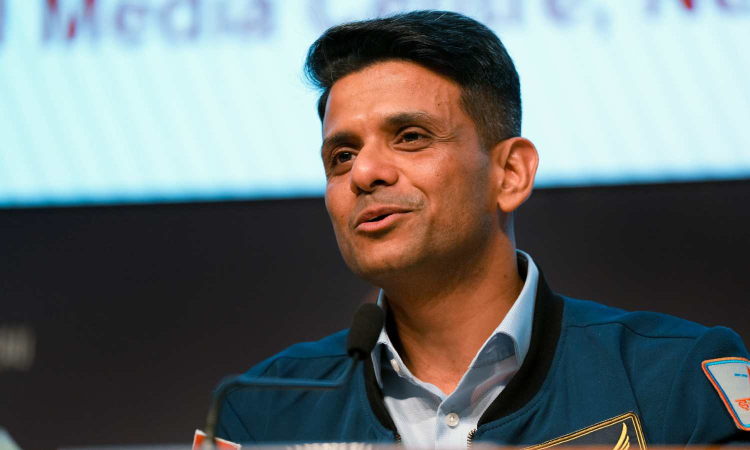Very soon, someone from our own soil, in our own rocket will travel to space: Shukla
Addressing a press conference here, Group Captain Shukla said the first-hand experience from the ISS mission was invaluable and a lot better than any training.

Astronaut and Group Captain Shubhanshu Shukla addresses a joint press briefing about Axiom-4 mission, in New Delhi, Thursday, Aug. 21, 2025 (PTI)
NEW DELHI: Excited after a successful mission to the International Space Station (ISS), Indian astronaut Shubhanshu Shukla on Thursday hoped someone would very soon travel to space "from our own capsule, from our rocket, from our soil".
Addressing a press conference here, Group Captain Shukla said the first-hand experience from the ISS mission was invaluable and a lot better than any training.
He also said India looks "saare jahaan se achcha (better than the entire world)" even today -- words first used by Indian astronaut Rakesh Sharma after his space mission in 1984.
On his Axiom-4 Mission, Shukla said the experience from the ISS mission would be very useful for India's own Gaganyaan mission, and he learnt a lot in the past year as part of his mission.
"No matter how much training you have done, even after that, when you sit in the rocket and the engines ignite, when they catch fire, I think it is a very different feeling.
"I had not imagined how it would feel, and I was actually running behind the rocket for the first few seconds, and it took me some time to catch up to it. From that moment until the time we splashed down, the experience was unbelievable. It was so exciting and so amazing that I have really been struggling to find words to convey it to you, so that you can live that experience through my words," he said.
At the press conference, Union Minister Jitendra Singh said the Department of Space has been around for nearly 70 years, and officially, the ISRO was established in 1969.
".... why all this had to happen only in the last few years, why it couldn't have happened in the last five, six decades. We have started following the strategies which are followed by the rest of the world. Now, our benchmarks are global benchmarks, our strategies are global, and the parameters that we are seeking to live up to are global," he said.
Group Captain Prasanth B Nair, who is part of India's Gaganyaan crew, said, "A few months from now, we are going to have Diwali. That is the time when Ram ji entered Ayodhya. Over here right now, if I can call myself Lakshman... even though I am older than 'Shuks' (Shukla), I would love to be Lakshman to this Ram any day."
"But let's remember Ram and Lakshman got a lot of help from the entire 'vanar sena', that is our fantastic ISRO team... otherwise it would not have been possible," he said.
Shukla thanked the government, ISRO and everyone else who worked hard to successfully execute the mission.
"I would also like to thank everyone who helped bring this mission to the population of our country, making it accessible for everyone to view. In the end, I would like to thank each and every citizen of this country who behaved in a way that made it feel like they actually owned this mission. I truly felt that this was a mission for the entire nation," he said.
Detailing the mission, he said, "We flew on top of the Falcon 9 vehicle in the Crew Dragon to the International Space Station for a period of two weeks and then returned.
"The launch was from Cape Canaveral, Florida, and recovery was off the coast of San Diego in the Pacific Ocean. Crew Dragon is one of the three vehicles that can currently take humans to space.
"We were also fortunate to have training on the Soyuz, which launches from Russia, as well as on Crew Dragon. The International Space Station, as you know, is an orbiting laboratory that has been operational since 2000. It has been conducting cutting-edge science and is actually a perfect example of international collaboration," he said.
Shukla is the first Indian astronaut to travel to the ISS.



